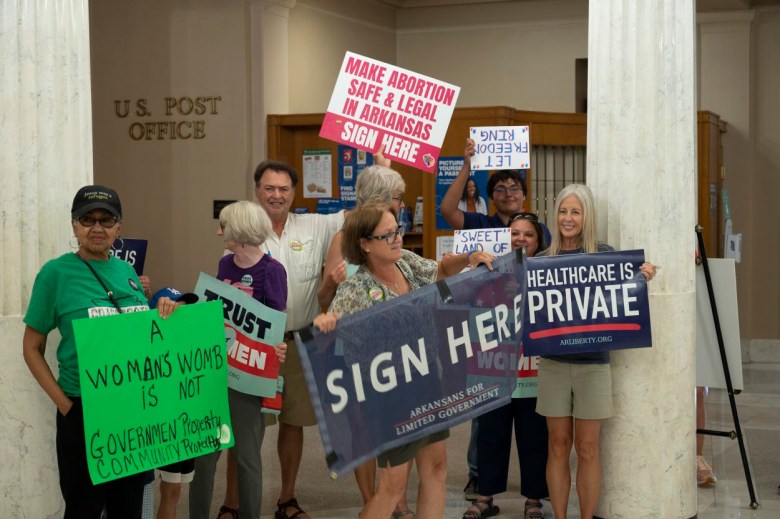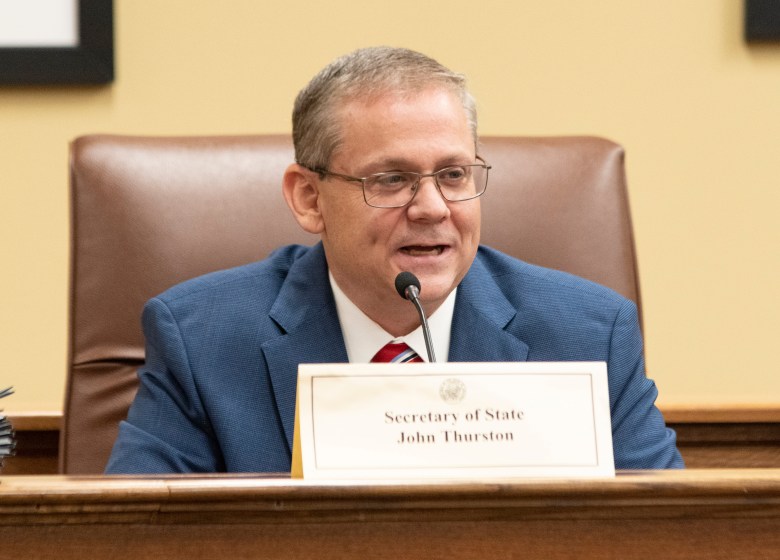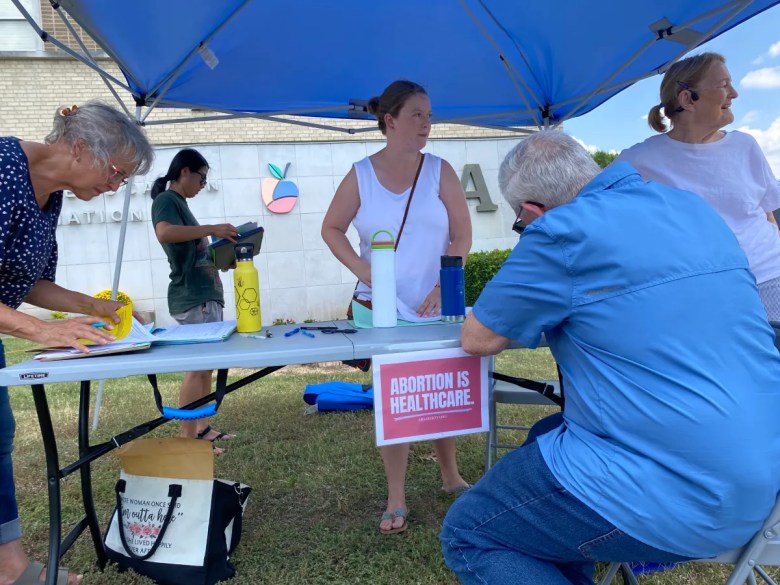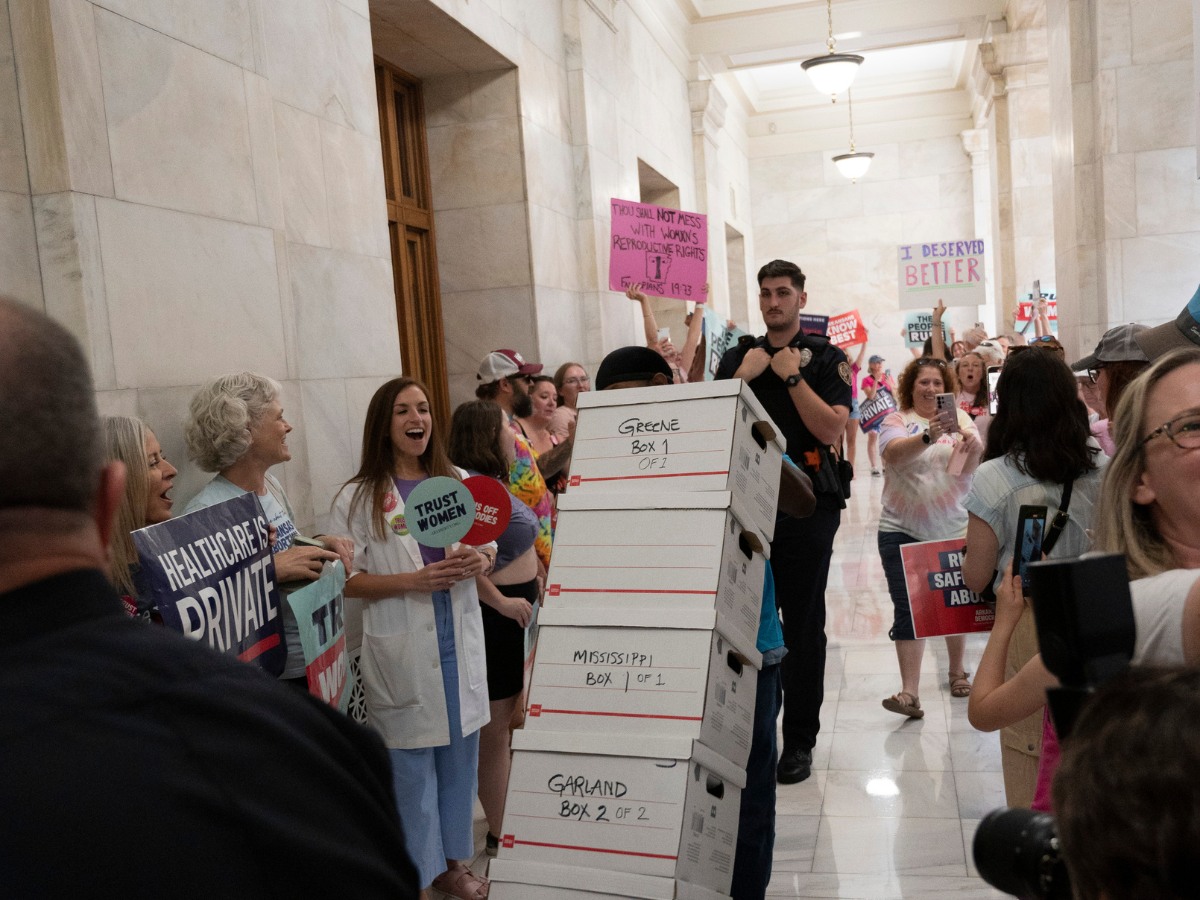Worn down after the homestretch push for signatures and woefully out of practice at winning much of anything, the first abortion amendment supporters to arrive at the state Capitol the morning of July 5 took a while to warm up.
Women in T-shirts printed with inspirational quotes and with hand-lettered posters tucked under their elbows dribbled through the security line starting around 11 a.m. that Friday, fresh-scrubbed but ruddy from hours, days and weeks of pacing sidewalks and manning tables in the summer sun, stubbornly collecting signatures in a bid to place a rollback of the state’s near-total abortion ban before Arkansas voters.
Rumors had started spreading the day before among the cadre of clipboard-wielding volunteers that their moonshot might actually pay off. A week that started with a 13,000-signature deficit had reached the 90,704 signatures needed to get on the November ballot, and then some. The scene on July 5 was a victory lap: Meet at the Capitol to whoop and holler and turn in boxes upon boxes of signed petitions. Pass it on.
Her sweaty sidewalk hustle finally done, Sebastian County volunteer captain Kellie Cobb clicked briskly into organizer mode as she waited for the petition to arrive. By noon, she was handing around a sack of multicolored “TRUST WOMEN” buttons to the swelling crowd and making sure everyone who’d arrived empty-handed got a slogany sign to shake: “Arkansans Know Best,” “Healthcare Is Private,” “The People Rule.”

A dispassionate PTA-mom efficiency helped Cobb and her fellow volunteers collect tens of thousands of signatures in what Arkansas conservatives like to brag is “the most pro-life state in the country.” By Friday morning, though, exhaustion and elation punched through in a collective dam break.
“We’ve all been crying all day,” Cobb admitted. “Our solidarity, the love of this group, these canvassers, 300 women across Arkansas. We’re all sisters now.” (Organizers trained hundreds of volunteers but estimated the core group that brought in most of the signatures numbered around 350.)
That sorority included women of all ages, doctors in lab coats and children dashing around with increasingly wilted posters in their grips.
There were men in the crowd, too. Dr. Chad Taylor, a Little Rock OB-GYN and advocate for abortion access especially in cases where nonviable fetuses are doomed to suffer and die, brought his 83-year-old dad. A veteran who manned submarines in the earliest days of the Cold War, Don Taylor said he admired his son’s bravery.
“His mother would have been proud,” he said.
Mostly, though, it was women who rushed the doors and leaned over the rotunda rails when a moving truck finally pulled up outside shortly after 2 p.m. The unsuspecting movers hired for the job soaked in a hero’s welcome as they maneuvered dollies towering with white banker boxes through the cheering horde.
In the end, Arkansans for Limited Government, the group formed last fall to sponsor the amendment, turned in the signatures of an estimated 102,730 registered voters. Unlike with most petition campaigns that manage to hit the threshold, paid canvassers collected only a fraction of the total — about 14,000. The other 88,000 or so were gathered by volunteers like Cobb, pounding the pavement in cities and towns in every corner of Arkansas, speaking to friends and family and neighbors, and arguing the righteousness of the cause.
A message sent out that day from Arkansans for Limited Government celebrated the moment but cautioned volunteers there would be more heavy lifts in store: “… on Monday we get back to work because women’s lives are at stake. The hardest job is ahead of us, and we will not fail,” Executive Director Lauren Cowles wrote.

Those words proved prescient. Five days later, on the afternoon of July 10, Arkansas Secretary of State John Thurston announced he was throwing out the abortion amendment on a technicality.
Uproar
The secretary of state’s office oversees the nuts and bolts of Arkansas’s ballot initiative process. Its staff is responsible for counting signatures, verifying those signatures belong to registered Arkansas voters and ensuring the groups behind petitions follow the rules.
In a perfunctory rejection letter, Thurston said abortion rights supporters hadn’t turned in a pair of required statements along with their petition — one listing the names of paid canvassers and another affirming that canvassers had been properly trained on state law. The group would have no chance to correct the error, he added.
State officials and anti-abortion activists pounced as soon as the news broke. “Failure to follow such a basic requirement is inexcusable,” Attorney General Tim Griffin gloated via official statement. “The abortion advocates have no one to blame but themselves.”
Gov. Sarah Huckabee Sanders piled on, too, assuming her usual snarl. “Today the far left pro-abortion crowd in Arkansas showed they are both immoral and incompetent,” she tweeted.
It was a gut punch for the organizers and their supporters — had all that effort really been for nothing, sunk by an unforced error?
But the next day, July 11, the plot thickened. When the Arkansas Times first asked Thurston’s office for all supporting documents Arkansans for Limited Government had submitted with its petition, a spokesman provided just three pages of records. Not long after, in response to a follow-up Freedom of Information Act request, he emailed back to say he’d “misspoke”: There were more records after all. Once the secretary of state’s office released the full slate of documents — more than 870 pages — Thurston’s reasons for nixing the abortion petition began to look more ticky-tacky.
The group had, in fact, turned in a list of all its paid canvassers. It had also submitted an affidavit from each canvasser attesting he or she had received the proper training. The only thing the group failed to turn in on July 5 was a signed statement from the organizers themselves, affirming that canvassers had been trained.
This statement is a requirement under the law, and is listed as one of the required elements for submitting a petition in the secretary of state’s handbook on ballot initiatives. But complicating matters further, Arkansans for Limited Government did in fact submit such a statement on June 27, eight days before the deadline, which would seem to cover at least the canvassers hired by that date.
In the days that followed, Thurston doubled down on his decision to reject the petition, but his explanations kept shifting. The June 27 statement shouldn’t count, he claimed, because it should have been signed by a different person. And he insisted the statement had to be turned in at precisely the same time as the signatures.

As Arkansans for Limited Government pointed out, there was another problem with Thurston’s argument. State law outlines a multi-step process for checking petition signatures, and the specific requirement cited by Thurston only seems to come into play at a later stage — not during the initial count of signatures. That small distinction has huge consequences, as it could open the door to a “cure period” for Arkansans for Limited Government to collect additional signatures. Thurston still refused to begin counting.
On July 16, the group filed a lawsuit asking the Arkansas Supreme Court to intervene. And on July 23, the court gave them at least a partial victory: It ordered Thurston to begin counting signatures collected by volunteers.
The order said nothing about signatures from paid canvassers, though — the crux of the dispute. The court only said it “reserves the right to issue further orders and proceed in accordance with state law.”
As this magazine went to press July 25, the fate of the Arkansas Abortion Amendment remained up in the air. The safe money is still on disqualification: The state Supreme Court is dominated by conservatives, and the court has a history of derailing would-be ballot measures on technicalities. But the July 23 order indicated that at least three of the seven justices would have sided with abortion petitioners.
If one of the remaining four justices agrees with the group’s arguments, even in part, they may still have a fighting chance. It wouldn’t be the first time organizers have beaten the odds.
Even if they lose the fight for access to the 2024 ballot, though, this much is certain: Arkansas women will try again.
A long game
Arkansas’s all-out abortion ban is one of the most punishing in the nation. With the U.S. Supreme Court’s Dobbs decision in 2022, a trigger law kicked into effect in Arkansas, banning abortion in all cases except to save the life of a mother. There are no exceptions for rape, incest or cases in which a fetus is guaranteed to die before birth or very soon after. That’s a tough pill in a state that already leads the nation in maternal mortality, teen pregnancy and infant mortality stats.
Enter a small squadron of Arkansas women unwilling to accept such a draconian edict. Given the Republican Party’s total dominance in Arkansas, the effort might seem futile. But recent ballot initiatives in similarly conservative states have successfully preserved abortion rights.
Policies that gain traction elsewhere can miss the mark in Arkansas, where voters skew solidly red but also bristle at state government telling them what to do. Polling data and vibe checks suggested Arkansans want to be able to make their own choices under extenuating circumstances but would balk at allowing elective abortions up to viability, the standard under the now-defunct Roe v. Wade decision.
According to the 2022 Arkansas Poll, the University of Arkansas’s annual measure of public opinion, only about 14% of voters support a total ban on abortion, while 21% said it should be legal under any circumstances. The vast majority, 58%, said it depends.
“The bottom line is that our policy — effectively a total ban — is far from the expressed preference of voters,” UA professor and pollster Janine Parry told the Arkansas Times earlier this year.
As such, crafters of the Arkansas Abortion Amendment measured, weighed, tweaked and formulated a proposed amendment specifically tailored to fit the state. The proposed language aims to balance Arkansas voters’ don’t-tell-me-what-to-do attitude with their conservative social predilections. The result was a state constitutional amendment to enshrine access to abortion through 18 weeks after fertilization, and in cases of rape, incest, fatal fetal anomaly and when the health of the mother is endangered.
As with all solid compromises, this one chafed on both sides. The 18-week cutoff underwhelmed Planned Parenthood, the American Civil Liberties Union and other national groups that could have sent support and significant amounts of cash, but didn’t. They considered Arkansas’s compromise amendment a step backward from protections under Roe v. Wade, and therefore not worth it.
At the same time, the usual pro-life suspects homed in on a lack of gestational age limits for abortions in cases of rape, incest, fatal fetal anomaly or to save a mother’s health as evidence that the amendment would spawn a wave of late-term abortions.
Rightwing extremist state Rep. Mary Bentley (R-Perryville) joined a scrum of hardline anti-abortion activists pushing fables of women killing their babies months or years after birth. At her most hyperbolic, she recently shared a tweet from an account with the handle “Dumfukdetector” of a clip from “Twilight” in which Dakota Fanning’s character chucks a toddler into a raging bonfire. “This is the evil we are dealing with!” Bentley wrote. “We can take care of women in crisis, there is no reason to kill babies. #RightToLife”
Former state Sen. Jason Rapert, infamous for trying to require fetal heartbeat checks via vaginal probe for Arkansans seeking abortion care before Roe v. Wade fell, issued a sarcastic blessing of hearts after Thurston rejected the petition on July 10. “Wouldn’t you hate to be the person responsible for screwing up approval of an alleged 100,000 person petition gathering operation?” he said on Twitter. “Well, when you actually think killing babies is compassionate I guess you aren’t really a rational thinker anyway.”
A hundreds-strong coalition of doctors and other medical providers offered a very different perspective. The current ban blocks doctors from intervening until women are literally on their deathbeds. And unclear language in existing law means that even then, doctors who step in to provide abortion care are scared they’re breaking the law, a misstep that could cost them their medical license and up to $100,000 in fines.

Dr. Jill Mhyre, an obstetric anesthesiologist and one of the white coats who celebrated at the Capitol July 5, said she’s tired of having to witness unnecessary suffering and withhold relief until death is imminent. “We just want to take care of women. We want to be able to care for them before they get critically ill. And we don’t want to be afraid for our medical licenses,” she said.
Plenty of Arkansans agreed. Most of the 102K-plus signatures came courtesy of a volunteer team. Arkansans for Limited Government trained roughly 800 volunteers on legalities and best practices for canvassing. About 350 of them did most of the heavy lifting in the field, although many of the sleepers shot back into action in the final weeks.
And while Arkansas abortion rights supporters missed out on the big institutional funding that helped clinch victories for similar efforts in other states, Arkansans for Limited Government had collected $409,082 in donations as of June 30, enough to hire the paid canvassers who secured signatures in some of the farther-flung counties without volunteers on the ground.
It turned out to be a mixed blessing. Without paid canvassers’ 14,000 signatures, Arkansans for Limited Government would have fallen short of the all-important 90,704 threshold. At the same time, questions over paperwork regarding paid canvassers are at the center of the ongoing legal ruckus.
Direct democracy, if you can keep it
Battles as bitter and seemingly unwinnable as the current fight over abortion rights in Arkansas have been won before.
In 2022, Kansas voters rejected an anti-abortion constitutional amendment referred by their conservative state Legislature by an 18-point margin, 59-41. Kentucky voters said no to a similar measure later that same year. And last year in Ohio, voters decisively approved a constitutional amendment to protect the right to an abortion up to viability.
This November, initiatives to restore or constitutionally protect abortion access are expected to be on the ballot in Arizona, Colorado, Florida, Maryland, Missouri, Montana, Nebraska, Nevada, South Dakota and (maybe) Arkansas. Some are blue or purple states that already allow abortion, but others are deeply conservative states that happen to have a process for citizens to initiate ballot measures.
Missouri and South Dakota ban abortion in almost all cases; Florida prohibits it after six weeks. Those states, along with Arkansas, are the new front lines in the post-Dobbs fight for reproductive rights.
Having a direct democracy process on paper, though, doesn’t mean voters can necessarily access it. In Arkansas, where conservatives monopolize all three branches of government, the deck is stacked against organizers.
Lawmakers have set up a “Squid Game”-level obstacle course that ballot hopefuls must try to navigate. From 2013 to present, the Arkansas Legislature has passed 12 laws changing the initiative process, nearly all of which were designed to make things more difficult and tedious under the guise of “preventing fraud.” The latest roadblock is a new law passed by the Legislature last year requiring petitioners to collect signatures from a certain number of voters in at least 50 of Arkansas’s 75 counties, rather than the 15-county requirement laid out in the state constitution.
Meanwhile, Thurston, Griffin and other executive branch officials play referee, calling fouls they say are fatal to the effort. Conservative courts affirm it all.
This year, several other progressive ballot initiatives fell short of signatures for the November ballot, while two proposals backed by big casino and marijuana money managed to reach the threshold (see sidebar). But even those well-funded initiatives could still be disqualified between now and November.
“National groups are hesitant to help fund ballot initiative campaigns here because they say Arkansas is ‘direct democracy in name only,’” said Arkansas Public Policy Panel Executive Director Bill Kopsky, who helped lead this year’s unsuccessful push for the Arkansas Educational Rights Amendment. “They don’t want to spend a couple million dollars, then watch as a group undertakes a massive effort, collects all the signatures — only to have the court throw it off the ballot for some random reason.”
That nightmare scenario has happened before. In 2020, an effort to establish a gerrymander-busting bipartisan redistricting process attracted twice the number of signatures required to get on the ballot, but was tossed out of the running by the state Supreme Court on the thinnest of procedural grounds.
Chris Melody Fields Figueredo, executive director of the national Ballot Initiative Strategy Center, has a bird’s-eye view of direct democracy efforts nationwide, and said the roadblocks in Arkansas aren’t altogether unique.
“As more and more people are turning to ballot measures to move forward issues and policies that communities care about, we have seen an uptick in challenges throughout the process,” she said.
Fields pointed to Ohio, where a cohort of conservative state lawmakers made an unprecedented last-minute play to raise the passage threshold for ballot measures to over 60% which was motivated by the abortion rights amendment that was ultimately approved by voters in 2023.*
“This is what we are seeing more and more. It’s tied to the rise of authoritarianism across the country, where people who are elected to office are going out of the way to undermine the power of the people,” she said.
A couple of weeks after that triumphant July 5 at the Arkansas Capitol, Kellie Cobb said she’s settling back into normal life. She dedicated 40-50 hours a week for months on end to the Arkansas Abortion Amendment effort, she said. Since Thurston’s unilateral decision July 10, Cobb has been following all the legal twists and turns and trying to manage expectations.

“I think we were all a little disappointed, but I’m not completely surprised,” she said. “I don’t want to seem jaded, but no one expected Sarah [Sanders] to make it easy.”
Cobb said she’s proud of volunteers’ efforts and certain they will rally to do it all over again if they have to. But they’re not giving up on this round yet.
In the face of ongoing obstruction from the state, organizers with Arkansans for Limited Government vowed to fight on.
Thurston’s actions “have thwarted the will of the people,” they said in a court filing July 22. “AFLG is a grassroots group, with hundreds of volunteers collecting the vast majority of the 101,525 signatures submitted for the Amendment. Petitioners, and the people they represent, exemplify the very spirit of the initiative process the Constitution protects.”
*A previous version of the story referenced a different attempt by Ohio officials to block the voters’ will.

